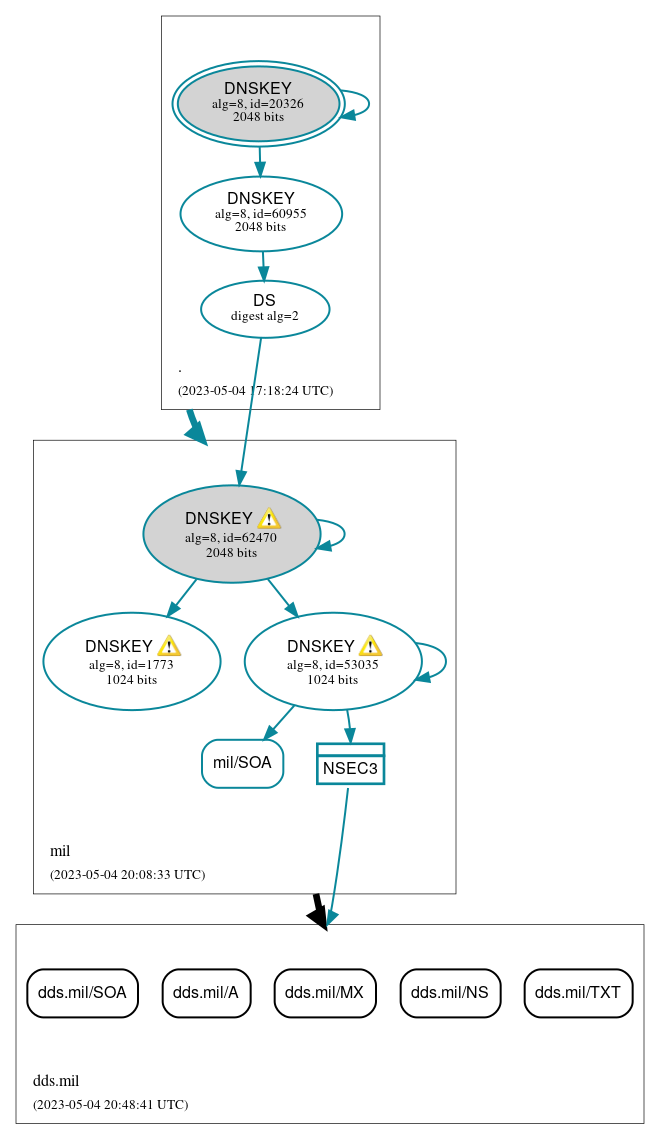dds.mil
Updated:
2023-05-04 20:48:41 UTC (950 days ago)
Go to most recent »
Notices
DNSSEC Authentication Chain
 RRset status
RRset status
Insecure (5)
- dds.mil/A
- dds.mil/MX
- dds.mil/NS
- dds.mil/SOA
- dds.mil/TXT
Secure (1)
- mil/SOA
 DNSKEY/DS/NSEC status
DNSKEY/DS/NSEC status
Secure (7)
- ./DNSKEY (alg 8, id 20326)
- ./DNSKEY (alg 8, id 60955)
- NSEC3 proving non-existence of dds.mil/DS
- mil/DNSKEY (alg 8, id 1773)
- mil/DNSKEY (alg 8, id 53035)
- mil/DNSKEY (alg 8, id 62470)
- mil/DS (alg 8, id 62470)
 Delegation status
Delegation status
Insecure (1)
- mil to dds.mil
Secure (1)
- . to mil
 Notices
Notices
Errors (3)
- NSEC3 proving non-existence of dds.mil/DS: An iterations count of 0 must be used in NSEC3 records to alleviate computational burdens. See RFC 9276, Sec. 3.1.
- NSEC3 proving non-existence of dds.mil/DS: An iterations count of 0 must be used in NSEC3 records to alleviate computational burdens. See RFC 9276, Sec. 3.1.
- dds.mil/DS has errors; select the "Denial of existence" DNSSEC option to see them.
Warnings (6)
- NSEC3 proving non-existence of dds.mil/DS: The salt value for an NSEC3 record should be empty. See RFC 9276, Sec. 3.1.
- NSEC3 proving non-existence of dds.mil/DS: The salt value for an NSEC3 record should be empty. See RFC 9276, Sec. 3.1.
- mil/DNSKEY (alg 8, id 1773): No response was received until the UDP payload size was decreased, indicating that the server might be attempting to send a payload that exceeds the path maximum transmission unit (PMTU) size. See RFC 6891, Sec. 6.2.6. (2608:4122:2:154::234, UDP_-_EDNS0_4096_D_KN)
- mil/DNSKEY (alg 8, id 53035): No response was received until the UDP payload size was decreased, indicating that the server might be attempting to send a payload that exceeds the path maximum transmission unit (PMTU) size. See RFC 6891, Sec. 6.2.6. (2608:4122:2:154::234, UDP_-_EDNS0_4096_D_KN)
- mil/DNSKEY (alg 8, id 62470): No response was received until the UDP payload size was decreased, indicating that the server might be attempting to send a payload that exceeds the path maximum transmission unit (PMTU) size. See RFC 6891, Sec. 6.2.6. (2608:4122:2:154::234, UDP_-_EDNS0_4096_D_KN)
- dds.mil/DS has warnings; select the "Denial of existence" DNSSEC option to see them.





 JavaScript is required to make the graph below interactive.
JavaScript is required to make the graph below interactive.



